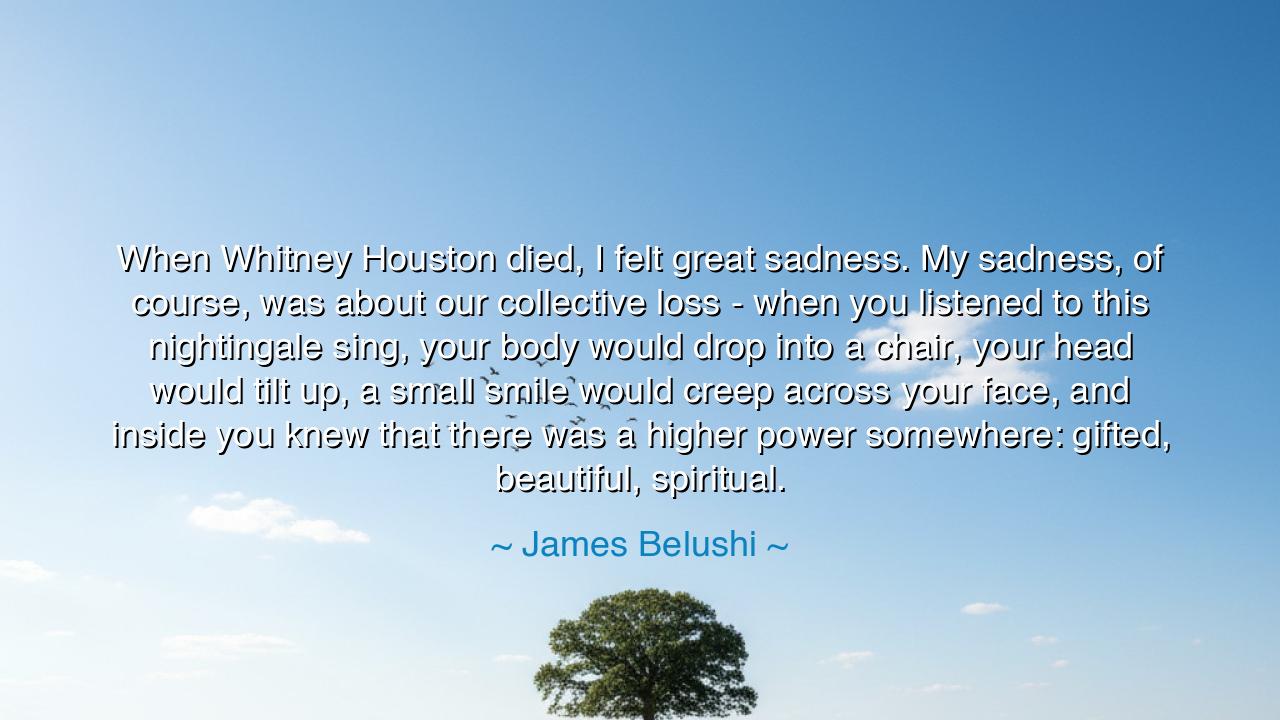
When Whitney Houston died, I felt great sadness. My sadness, of
When Whitney Houston died, I felt great sadness. My sadness, of course, was about our collective loss - when you listened to this nightingale sing, your body would drop into a chair, your head would tilt up, a small smile would creep across your face, and inside you knew that there was a higher power somewhere: gifted, beautiful, spiritual.






The words of James Belushi, “When Whitney Houston died, I felt great sadness. My sadness, of course, was about our collective loss – when you listened to this nightingale sing, your body would drop into a chair, your head would tilt up, a small smile would creep across your face, and inside you knew that there was a higher power somewhere: gifted, beautiful, spiritual,” carry the weight of both mourning and reverence. In this tribute lies the recognition that certain voices, certain souls, are not merely performers of art, but vessels through which the divine breath flows. The sadness Belushi speaks of is not only his own grief, but the grief of an entire people, mourning the silencing of a voice that once lifted them beyond themselves.
At the center of his words stands Whitney Houston, called here a nightingale, a creature whose song has long symbolized purity, transcendence, and the touch of the sacred. When such a voice is heard, it bypasses the intellect and pierces the spirit, leaving listeners undone. Belushi describes the human reaction perfectly: the body sinking into stillness, the face rising upward, a smile born not of amusement but of awe. In such moments, we glimpse eternity in sound. This is why her passing was felt as a collective loss—for she belonged not only to herself, but to the millions who carried her voice within them.
The ancients also honored such figures, believing that certain singers, poets, or prophets were chosen to channel the voice of the divine. The Greeks spoke of the Muses, daughters of memory and inspiration, who whispered sacred melodies into the ears of artists. The Hebrews told of David, whose harp soothed troubled kings and summoned the presence of God. In every age, there have been those whose voices were more than human. Houston’s was one of these: gifted, beautiful, spiritual, a reminder that heaven sometimes lends its voice to earth.
Belushi’s words also carry the tension between loss and remembrance. Though Houston’s voice is silenced in life, it continues to echo in memory and recording, drawing forth tears, smiles, and reverence even now. This paradox is familiar to history. When the poet Sappho’s works were mostly lost to time, ancient writers mourned not only the woman but the silencing of a divine instrument. Yet even fragments of her poetry could still stir hearts centuries later. Likewise, though Whitney is gone, her music remains, and through it, her gift endures beyond mortality.
There is a deeper teaching here about how art connects us to something greater than ourselves. Belushi speaks of knowing, in the presence of Whitney’s song, that “there was a higher power somewhere.” This is no idle thought. Great art often functions as revelation. It opens a window through which we perceive beauty so pure it cannot be explained by chance alone. Whether in the soaring notes of a singer, the strokes of a painter, or the words of a poet, there are moments when art becomes sacrament, lifting us beyond the ordinary and whispering of eternity.
The lesson, then, is twofold: first, to recognize and honor such gifts while they are among us; and second, to understand that the truest power of art is not in fame or applause, but in its capacity to awaken our spirits. Houston’s voice made us smile, not because it entertained us, but because it reminded us that we are part of something larger, more radiant, more divine than we can comprehend. Such experiences are not trivial—they are lifelines for the soul in a weary world.
To practice this wisdom, let us listen more deeply to the voices around us—not only the great singers, but the everyday music of life: a child humming, a stranger laughing, the rustle of wind in the trees. Each can be a reminder of the higher power that Belushi sensed in Houston’s song. And when we find artists who truly carry that divine spark, let us celebrate them, support them, and learn from them, for they are rare and precious.
So remember, O seekers of tomorrow: when a nightingale sings, do not let the moment pass lightly. Sink into your chair, lift your head, let the smile rise upon your face, and feel the presence of the eternal. For in voices like Houston’s, humanity is reminded of its kinship with the divine. And though such voices may fall silent, their echoes will never die, for they are written into the very fabric of our hearts.






AAdministratorAdministrator
Welcome, honored guests. Please leave a comment, we will respond soon